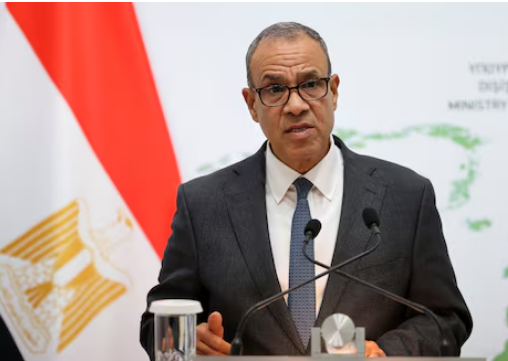
Egyptian Foreign Minister Badr Abdelatty speaks during a press conference with Cyprus Foreign Minister Constantinos Kombos (not pictured) at the Foreign Ministry in Nicosia, Cyprus, September 5, 2025. REUTERS/Yiannis Kourtoglou/File Photo Purchase Licensing Rights
Published September 7, 2025
Egypt and Qatar have sharply condemned Israeli Prime Minister Benjamin Netanyahu’s recent remarks suggesting that Palestinians in Gaza should have the option to voluntarily leave the region. Egyptian Foreign Minister Badr Abdelatty dismissed the characterization of displacement as voluntary, calling it “nonsense” and emphasizing that the dire conditions in Gaza, including famine, are being deliberately created to force Palestinians off their land.
In a joint statement, Egypt labeled any attempt to forcibly displace Palestinians as a “red line,” describing such actions as a violation of international humanitarian law and tantamount to war crimes. Qatar echoed this sentiment, condemning Netanyahu’s remarks as an extension of Israel’s policy of violating Palestinian rights and collective punishment. Both nations reaffirmed their commitment to preventing the displacement of Palestinians and called for international unity to confront these policies.
These developments come amid ongoing Israeli military operations in Gaza, which have resulted in significant casualties and displacement. While Hamas agreed to a 60-day ceasefire proposal in August, including the partial exchange of hostages and prisoners, Israel has delayed agreement, with Netanyahu insisting on terms favorable to Israel. Egypt continues to push for a ceasefire and has been in discussions with U.S. envoy Steve Witkoff to intensify efforts to implement the proposal.
The international community remains divided on the issue, with Egypt and Qatar leading regional opposition to any form of Palestinian displacement, while Israel maintains that its actions are in self-defense. The situation continues to evolve, with diplomatic efforts ongoing to address the humanitarian crisis in Gaza.
👥 Public/Political Reactions
-
Egypt’s Response: Egyptian Foreign Minister Badr Abdelatty strongly rejected Netanyahu’s remarks, calling the characterization of Palestinian displacement as “voluntary” nonsense. Egypt described any forced displacement as a “red line” and a violation of international humanitarian law, warning that such actions could amount to war crimes.
-
Qatar’s Response: Qatar echoed Egypt’s condemnation, framing Netanyahu’s comments as part of Israel’s ongoing policy of collective punishment against Palestinians. The country stressed the importance of protecting Palestinian rights and called for international unity against displacement.
-
Regional Impact: Other Arab nations closely aligned with Egypt and Qatar expressed concern, signaling potential diplomatic tensions and solidarity with the Palestinian population.
-
Israel’s Position: Israeli authorities maintained that any military actions, including discussions of displacement, are conducted in self-defense. Netanyahu insisted on terms favorable to Israel in ongoing ceasefire negotiations, contributing to regional and international controversy.
-
International Community: The statements by Egypt and Qatar have amplified calls for intervention from international organizations, including the UN, to prevent humanitarian catastrophe and uphold international law.
This highlights a sharp divide between regional powers opposing displacement and Israel’s defense-oriented stance, intensifying diplomatic friction.
 Resulting Effects
Resulting Effects
The resulting effects of Netanyahu’s remarks and the broader situation in Gaza are multifaceted:
-
Heightened Regional Tensions: Egypt and Qatar’s strong condemnation signals growing diplomatic friction between Israel and key regional actors. These statements may strain Israel’s relations with Arab states that have normalized ties in recent years.
-
International Diplomatic Pressure: By labeling forced displacement as a violation of international law, Egypt and Qatar are mobilizing international opinion against Israel’s policies, potentially increasing pressure from the UN and other global bodies to prevent mass displacement.
-
Humanitarian Concerns: The remarks exacerbate fears among Palestinians about potential forced displacement. Coupled with ongoing military operations, this worsens the humanitarian crisis in Gaza, including risks of famine, lack of medical supplies, and civilian casualties.
-
Political Polarization: The Israeli government’s stance may deepen divisions domestically and internationally, with supporters framing actions as self-defense and critics citing human rights violations.
-
Impact on Ceasefire Negotiations: Egypt’s push for a ceasefire may face complications as distrust grows. Netanyahu’s insistence on terms favorable to Israel could slow diplomatic progress and prolong hostilities.
-
Media and Public Opinion: Global coverage of these remarks could shape perceptions, increase activism, and influence policy debates in other countries regarding aid, sanctions, or diplomatic intervention.
The combined effect is a tense, volatile situation with both immediate humanitarian risks and long-term geopolitical consequences.
🔮 Future Outlook
The future outlook for the situation surrounding Netanyahu’s remarks and Gaza’s humanitarian crisis can be summarized as follows:
-
Continued Diplomatic Tensions: Egypt and Qatar are likely to maintain a firm stance against any displacement of Palestinians, pushing for international intervention. Other Arab and Muslim-majority countries may join in condemning Israel, increasing regional pressure.
-
Prolonged Humanitarian Crisis: Without a swift and enforceable ceasefire, Gaza may face worsening shortages of food, water, medical supplies, and shelter, leading to higher civilian suffering and displacement risks.
-
Potential Escalation of Conflict: Delays in reaching a ceasefire and continued Israeli military operations could lead to further casualties and destruction, raising the risk of retaliatory attacks from Hamas or other militant groups.
-
International Mediation Efforts: Egypt, along with international actors like the U.S. and UN, will likely continue to mediate, seeking a temporary truce or long-term ceasefire. Success will depend on Israel’s willingness to negotiate terms acceptable to all parties.
-
Global Political Pressure: The international community may increase diplomatic pressure on Israel, possibly involving resolutions at the UN or calls for accountability, especially if forced displacement occurs or civilian casualties rise significantly.
-
Public Opinion and Advocacy: Global media coverage and social campaigns may influence policy decisions and humanitarian aid, potentially amplifying international support for Gaza and affecting Israel’s diplomatic standing.
 Bottom Line:
Bottom Line:
The recent remarks by Israeli Prime Minister Benjamin Netanyahu suggesting that Palestinians in Gaza could “voluntarily” leave have triggered strong condemnation from Egypt and Qatar, highlighting deep regional and international concern. These statements underscore the fragile humanitarian situation in Gaza, where ongoing military operations have already caused significant civilian suffering and displacement.
Egypt and Qatar’s labeling of any forced displacement as a violation of international law raises the stakes diplomatically, signaling potential regional backlash and increased international scrutiny on Israel’s actions. The situation has heightened tensions, complicated ceasefire negotiations, and amplified calls for global intervention to prevent further humanitarian catastrophe.
Moving forward, the crisis remains precarious: the combination of military operations, political rhetoric, and stalled negotiations threatens to worsen conditions on the ground, while diplomatic efforts by regional and international actors will be critical in shaping whether escalation or resolution prevails.
SOURCES: REUTERS – Egypt says describing displacement of Palestinians as voluntary is ‘nonsense’
AL JAZEERA – Egypt, Qatar condemn Netanyahu remarks on displacing Palestinians in Gaza





Be the first to comment